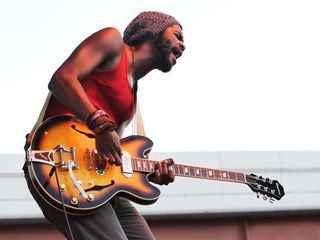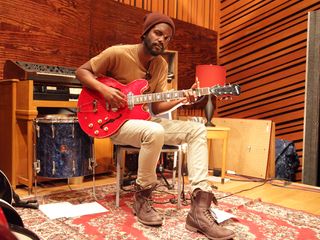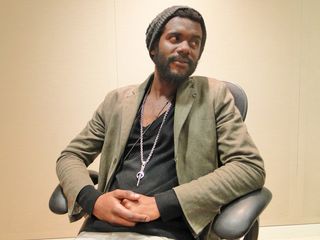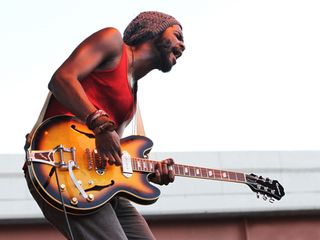
Gary Clark Jr. playing one of his beloved Epiphone Casinos. © Joe Koch
"All that stuff that's happening, the 'buzz' and all that, it's been good," says rising blues star Gary Clark Jr. "To go out and play shows and have a lot of people actually excited about what I'm doing, that's pretty cool. I'm still getting used to it.
"But as far as how it's all affecting me, the hype and whatever, I'm just kind of in the moment. I don't let it get to me. I'm enjoying the ride. The fact that people are talking about me is a good thing. I'm grateful, and I'm and looking forward to kicking out some more music."
Many people are looking forward to the very same thing, for 2011 was the year that Gary Clark Jr. exploded on the music scene with a force not witnessed since the early days of Stevie Ray Vaughan. What's especially amazing about Clark, though, is that he has yet to release a full album - the excitement that's swirling around him is based on a recently issued four-song set called The Bright Lights EP and a string of high-profile appearances, starting with his rousing set at Crossroads in 2010 and culminating with an Alicia Keys benefit last Novemeber, during which he joined the songstress for a fiery take on While My Guitar Gently Weeps.
Those who have seen Clark in concert recognize him as the genuine articlel, as much a traditionalist as he is a bold, modern-day stylist, one who stretches the blues like a rubber band, burying it in noise, distortion and an almost punk attitude, laying it down over massive, 21st-century grooves.
In a genre that offers so much fake reverence to form, it's almost overwhelming to encounter the real deal, a true original that can take his sound in so many different directions. MusicRadar caught up with Clark in New York City, on the day that he was taping a spot on The Late Show With David Letterman. We spoke with the hot young bluesman about the rush of attention coming his way, how he came up, his influences and his guitars.
You've stated that you don't consider yourself strictly a blues artist. Can you elaborate?
"Yeah, sure. When I say 'blues'…see, I grew up listening to all kind of things, not just the blues, although I certainly did listen to a lot of blues. And a lot of modern music is based on the blues, so it gets mixed around and changed a lot. I do consider myself a blues musician, but I don't want people to have preconceived notions of what that's about.
"I'm not going to play straight-ahead I-IV-V things all the time, although I do love doing that. There's a lot of influences that are in me and they come out in my music. Some things are crazy and trippy, psychedelic, loud and fuzzy!" [laughs]
Such as?
"Shuggie Otis. Hendrix - he's a big one. Curtis Mayfield…Stevie Wonder…Prince - I think he's just mad! And then the Kings - Freddie King, Albert King, BB…they're all amazing. Let's see…Albert Collins, Hound Dog Taylor - he totally flipped my whole thing around. And Elmore James - he's a guy I keep going back to. There's so many people, it's hard to think of them all."
"Blues" is such an amorphous term. Like "rock 'n' roll," it can mean so much.
"Yeah, that's true. When I think 'the blues,' I immediately think of guys like Son House, Skip James, Charlie Patton, Howlin' Holf, Muddy, Otis Rush - I think of them and their music. Those are my guys, my big blues heroes. To me, they make up the blues foundation."

Clark in the studio with his cherry red Casino.
How did you get into music? When did you first pick up the guitar?
"I've always been into music. My parents had a record player and all these records - I used to break needles and bands trying to be a DJ! [laughs] I would sing along and dance along. I started bugging my mother for a guitar, and she was like, 'What are you going to do with a guitar? You have zero attention span!' But I kept on my parents, and eventually I got one.
"I was just drawn to the guitar. This is kind of funny, but I saw these pictures of Tito Jackson playing his 335, and I just loved the look of that cherry red guitar. It looked so beautiful to me. I just loved that whole image.
"My first guitar was an Ibanez Blazer - black, with two humbuckers, maple neck. I had a little 10-watt amplifier. But you know, from that day forward, it was on! [laughs] I was playing the guitar. A friend of mine, Eve, gave me a copy of Texas Flood and Hendrix's Ultimate Experience. I took those home and played along to them. Immediately, I was focused on what I wanted to do."
Did playing the guitar come pretty naturally to you?
"I don't really know. I was just so into it that I didn't care if it sounded good or if it didn't. There'd be times when I was playing and my mom would bang on the walls: 'That's enough of that!' [laughs] But you know how it is when you're into something - you're all in. After a year or so, my parents actually wanted me to play guitar for them. So I guess it came to me naturally to me because I knew it's what I wanted to do."
Growing up in Austin, did you have an awareness of the importance of Stevie Ray Vaughan and what the blues meant to the town?
"Yeah, once I got Texas Flood, I started becoming aware of the whole thing. People told me, 'That guy was from Texas.' And then I read about Jimmie Vaughan and the Fabulous Thunderbirds, the whole thing. I found out about Antone's and what an important place it was. I didn't realize the connections between everything and everybody till a little later, but yeah, I did my homework. [laughs] Before all that, I wanted to be in a boy band."
What?!
"Yeah! [laughs] I had a little thing with my friend Robbie. We called ourselves Young Soul. We'd hang out in the hallways and sing. The girls really liked him, so I was the guy who sang with Robbie. I did the falsetto, which wasn't a problem at 12. [laughs] We were into it. We had our dance moves - I don't know how cool they were, but we did 'em anyway.
"But once I got the guitar - and my friend Eve really got me in the real direction - that was it. I was going to be a guitar player."
So when did you become a student of the blues?
"Probably around 8th grade or so. That's when I got into it. But I was listening to pop and hip-hop and all that stuff, too. Whatever was on the radio, if it was good, I liked it. But I went to a blues jam around this time, and I really loved it. I was hooked. I heard this guy John McVey play a song, San Jose by Freddie King, and my head just went off. I started getting into all the big guys."
At what point would you say you started developing your own style?
"I had always been trying to do my own things. I had a little keyboard that I made beats on, and I'd play my guitar to that. So I was writing my own songs and stuff like that. I think it all started in my teenage years - I was kind of shy and awkward, so I would pour everything into my music.
"But for real, it wasn't until I was 23 or 24 that I started putting my influences into my own music and everything came together. The big beats and the Dr. Dre influence…all the Houston hip-hop stuff that was blowing up...I tried to infuse all of that into my own thing."

Gary Clark Jr., enjoying the ride and ready for whatever comes. © Joe Bosso
At what point were you really dedicated to being a professional musician?
"Probably right around then. I was 23, 24."
Did you go to college?
"No, I didn't. I had the opportunity to go to the University of Texas, but I didn't."
Were you parents cool with that?
"No. [laughs] Not at all. But really, when I moved out of my parents' house, I was out on my own. I was playing gigs and being a musician. I was still doing more straight-ahead blues gigs, though, doing the I-IV-V shuffle. This was before I put everything together in my own way."
How did you get booked on the Crossroads bill in 2010? That's when a lot of people first heard about you.
"Basically, that was through meeting Jimmie Vaughan and Doyle Bramhall II. They were really supportive, and I guess they got my name over to Eric Clapton. One day, I got this invitation in the mail to come play the Crossroads festival. I was like, 'OK!' [laughs] After that, everything went wild."
One would assume you met Clapton…
"Oh yeah. It was awkward for me. It was cool for him, because I guess it was pretty normal for what happens to him all the time. I walked up to him - I was pretty nervous because there were all these folks around him - and I said, 'Thank you for inviting me to you festival. This is pretty amazing for me, I'm just this kid from Austin, Texas.' And he was like [adopts British accent], 'Oh, no problem. Thank you for coming.' And I kind of walked off. [laughs] But it was cool. The whole thing was great."
Meeting Jimmie Vaughan, what was that like?
"It was cool. He's been real supportive. He came up to one of my gigs, I think I was doing a Jimmy Reed song. The next day he called me and invited me to lunch. We wound up going to a music shop, and he bought these harmonicas. He taught me how to play the harmonica. [laughs] He showed me first position, second position, all this stuff. That's how we started hanging out."
Let's talk about a few elements of your style. In the song Don't Owe You A Thang, you do some cool fingerpicking, almost a clawhammer style.
"Elizabeth Cotton was somebody I really watched and studied. Other than that, I can't think of anybody. It really came about from her…well, there was Albert Collins, too…but mostly, it's kind of my own thing. Jimmie Vaughan also plays with his fingers."
In the same song, you do a flamenco thing, almost Pete Townshendish.
"Yeah, yeah. I never studied The Who, but I've always been drawn into how powerful they were. All that kind of stuff, hey, I stole that from Stevie Ray Vaughan. [laughs] That song Dirty Pool, that's where it all comes from."
Is your EP indicative of what we can expect from your debut album?
"I'm not sure. I did some other tracks with Rob Cavallo that are ready to go. So I'm going to go hang with him and finish some things. Then I have some things I recorded in Austin that I'll finish.
"For the album, I'll be using a full band. As far as direction, I'm not exactly sure at this point. I'm looking to have it out in the fall of 2012. I'm going to go back home soon and I'm hoping to get into it. We'll see how it unfolds. I've got some things to feed from."
The guitars you're playing live are all Epiphone Casinos?
"That's right. I love those guitars. A couple of them are Elitist Casinios, and then the cherry red one, that one was made in Korea. I don't change them in any way, I love them right the way there are. I picked one up in a shop and I fell in love with it. I always wanted a hollowbody, even going back to the Tito Jackson thing, and the minute I played a Casino, that was it.
"It's such a versatile guitar. No matter what pickup position I choose, it works for me. The whole thing is on, you know? Their whole look, too - they're beautiful, like a beautiful woman, their curves and everything. [laughs] I know that sounds funny. I think they're incredible guitars, that's all. They really work for me."
Amp-wise, what are you using?
"Fender Vibro-Kings. The combination of the Vibro-King and the Casino, it does it. Those amps, they break up really nice at a certain volume, around three or four, and you can't get that from other amps. Put them with the Casino and you've got a really cool sound. It's a low, chunky, nasty sound, but it can still scream, you know? And yet, it can sing to you, too. You've gotta work it. There's a lot going on there."
What do you use for pedal effects?
"I use a couple of things. I have a Fulltone Octafuzz and an Ibanez Tube Screamer. The Tube Screamer is a go-to pedal. I was wondering what Stevie was steppin' on, and it was one of those green boxes. I'm playing around with a couple of wahs, rotating between Vox and Dunlop and trying to figure out the best one. Then I'm experimenting with some delay pedals, Roland and a couple of things."
Let's finish up on the topic of feedback. Jimi Hendrix was one of the first to use it as a real element of his playing. What's your take on incorporating it into your music?
"I'm still figuring it out, still experimenting. There are times when I know that I'm over the top, but you know, it's fun. [laughs] For a long time, I heard what everybody in Austin was saying, that you're supposed to play with no effects. I was trying to go along with that. But then one day, I said, 'Why not?' You know, they're just toys, but you might get something out of them. So I stomped on the fuzz and played with the feedback. I enjoy it. I don't know where I'm at with it, but I do like it. We'll see where it takes me."


